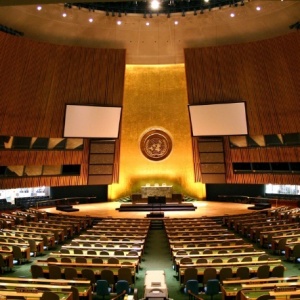
This paper looks at how global institutional arrangements and the lack of a global nutrition policy are hindering successful functioning of the global food system by failing to provide international public goods and services for poverty reduction.
It points to a series of major challenges that the current world food and agricultural system and the governance structure is not able to handle.
The authors highlight challenges that are inherent in international governance and that impede the creation of a well-functioning food system that can deliver on the sustainable development goals. They also propose a new set of institutional arrangements where an International Panel on Food, Nutrition and Agriculture (IPFNA) is established, partly following the design of the Intergovernmental Panel on Climate Change (IPCC).
The main ideas presented are to establish (1) a platform that facilitates the coordinated delivery of IPGs, (2) a set of thematic clusters that overcome silos, and (3) a science and research-based global assessment mechanism to provide an evidence base for strategic direction of policy actions.
The authors write:
“The body should have a legalized intergovernmental authority and could take the form of a ‘Platform for international food, nutrition, and agriculture’. It should be designed as a coordination mechanism that can facilitate global action as well as government-to-government networks, with inclusion of private sector and civil society actors. This Platform should be flat in hierarchical structure and thus able to respond quickly to new risks. The Platform would be truly independently governed and could be built on a further strengthened CFS. Connected to the Platform, FAO should be strengthened to deliver the IPGs (International Public Goods, FCRN addition) that facilitate sustainable agricultural intensification under climate change, food security information and global food safety services. Second, global nutrition policy needs an organizational home rather than being split among many agencies; and third, the WFP needs to be supported to better mitigate and respond to emergency food crises by getting a reliable global food store and funding that permits flexible response. These three proposed elements should be integral to the Platform and follow the design principle to match global organizational capacity with the agreed scope for IPG delivery”.
They also present a structure of three focal clusters for the organisational setup:
“Cluster 1 on food and nutrition security, and food safety: serving IPG action areas identified in section 'Analyzing the Current Situation' above: (3) Trade regime and food reserves, and related global information; (6) Responding to and preventing food and nutrition emergencies; (7) Transboundary food safety and health related investments and standards;
Cluster 2 on protection of natural resources: serving IPG action areas identified in section 'Analyzing the Current Situation': (1) Natural resource management related to biodiversity, water, and soils; (2) Climate change adaptation and mitigation;
Cluster 3 on enhanced sustainable intensification and productivity growth: serving IPG action areas: (4) Sound competition policy and standards for FDG; (5) International research and innovation in food and agriculture.”
Abstract
We point to deficits in current global institutional arrangements in support of agricultural development and food and nutrition security. A framework for global institutional arrangements proposed here is the set of essential international public goods for a well-functioning world food system. These public goods include international natural resource management; trade and transboundary competition policy; research and innovation; handling large scale food emergencies; and transboundary food safety. Based on the framework, and institutional economics considerations, causes of current malfunctioning of global food governance are analyzed. It is proposed to redesign global food governance by establishing an international platform with policy clusters mapped along the set of global public goods. To support the platform with needed research-based evidence an International Panel on Food, Nutrition and Agriculture (IPFNA) is suggested, partly following the design of the Intergovernmental Panel on Climate Change (IPCC). Existing organizations and mechanisms would form building blocks of the strengthened and redesigned governance system. A gradual approach toward redesign is proposed. Some redesign in the suggested direction was triggered by the food crisis of 2008, as demonstrated by the reform of the Committee on Food Security (CFS) with its high level panel of experts, but more is needed.
Citation
von Braun, J., Birner, R., (2016) Designing Global Governance for Agricultural Development and Food and Nutrition Security, Review of Development Economics, DOI: 10.1111/rode.12261
Read the paper (open access) here.
You can find related resources in the research library categories on governance and policy, food security and nutrition, food and agriculture policy, nutrition policy.







Post a new comment »